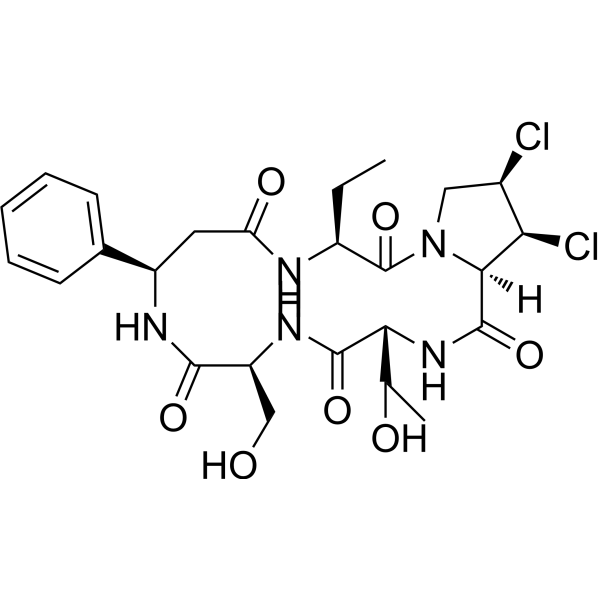151201-76-2
| Name | astin B |
|---|
| Description | Astin B is a orally active and potent cyclic pentapeptide, that can be isolated from Aster tataricus. Astin B has hepatotoxic effects in vitro and in vivo and that hepatic injury was primarily mediated by apoptosis in a mitochondria/caspase-dependent manner. Astin B induces autophagy in L-02 cells, increases LC3-II and decreases p62 expression[1]. |
|---|---|
| Related Catalog | |
| Target |
Bcl-2 Bax Caspase-3 Caspase-9 |
| In Vitro | Astin B (0-60 μM, 12-48 h) 抑制 L-02 细胞的增殖[1]。 Astin B (0-60 μM, 24 h) 诱导氧化应激和线粒体功能障碍,调节 Bcl-2/Bax 表达并增加 caspase-3 和 -9 活性[1]。 Astin B (0-60 μM, 24 h) 在 L-02 细胞中诱导自噬以防止细胞凋亡[1]。 Astin B 在肝细胞中引起氧化应激相关炎症,活性氧 (ROS) 水平升高、细胞内谷胱甘肽 (GSH) 含量降低以及 c-Jun 氨基末端激酶 (JNK) 磷酸化增强得到证实[1]。 |
| In Vivo | Astin B (10 mg/kg,口服,每天一次,连续 7 天) 诱导小鼠肝损伤[1]。 Animal Model: Male ICR mice (6–8 weeks of age, 10 per group)[1] Dosage: 10 mg/kg Administration: Orally administered, once daily for 7 consecutive days Result: Induced liver injury in mice. Compared to the control group, the serum levels of ALT and AST in mice treated with astin B were elevated about 11.9 and 2.26 times, respectively. |
| References |
| Molecular Formula | C25H33Cl2N5O7 |
|---|---|
| Molecular Weight | 586.46 |
